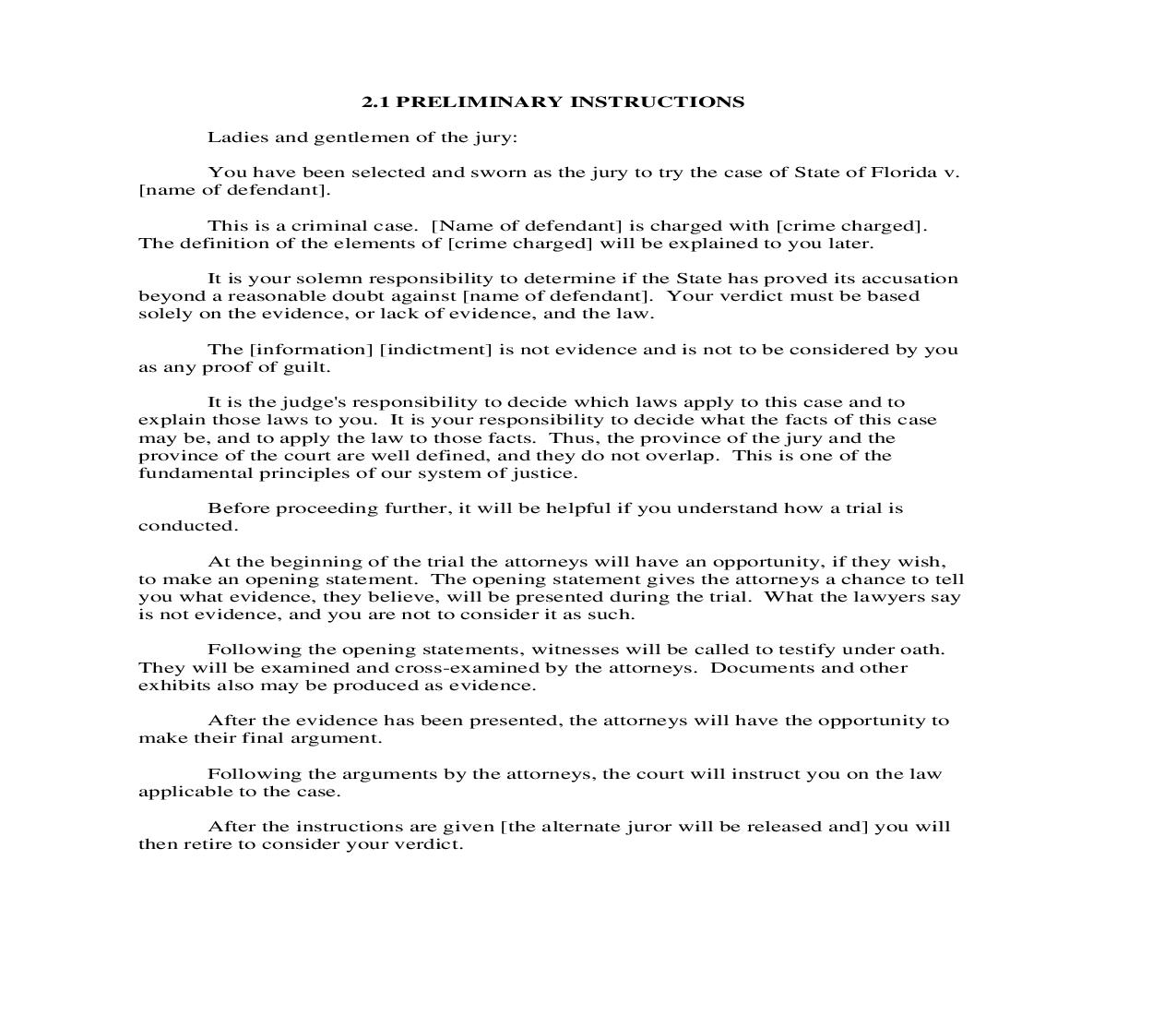
Last updated: 2/28/2006
2.1. Preliminary Instructions
Start Your Free Trial $ 13.99What you get:
- Instant access to fillable Microsoft Word or PDF forms.
- Minimize the risk of using outdated forms and eliminate rejected fillings.
- Largest forms database in the USA with more than 80,000 federal, state and agency forms.
- Download, edit, auto-fill multiple forms at once in MS Word using our Forms Workflow Ribbon
- Trusted by 1,000s of Attorneys and Legal Professionals
Description
2.1 PRELIMINARY INSTRUCTIONS Ladies and gentlemen of the jury: You have been selected and sworn as the jury to try the case of State of Florida v. [name of defendant]. This is a criminal case. [Name of defendant] is charged with [crime charged]. The definition of the elements of [crime charged] will be explained to you later. It is your solemn responsibility to determine if the State has proved its accusation beyond a reasonable doubt against [name of defendant]. Your verdict must be based solely on the evidence, or lack of evidence, and the law. The [information] [indictment] is not evidence and is not to be considered by you as any proof of guilt. It is the judges responsibility to decide which lawapply to this case and to s explain those laws to you. It is your responsibility to decide what the facts of this case may be, and to apply the law to those facts. Thus, the province of the jury and the province of the court are well defined, and they do not overlap. This is one of the fundamental principles of our system of justice. Before proceeding further, it will be helpful if you understand how a trial is conducted. At the beginning of the trial the attorneys will have an opportunity, if they wish, to make an opening statement. The opening statement gives the attorneys a chance to tell you what evidence, they believe, will be presented during the trial. What the lawyers say is not evidence, and you are not to consider it as such. Following the opening statements, witnesses will be called to testify under oath. They will be examined and cross-examined by the attorneys. Documents and other exhibits also may be produced as evidence. After the evidence has been presentedthe attorneys will hav, e the opportunity to make their final argument. Following the arguments by the attorneys, the court will instruct you on the law applicable to the case. After the instructions are given [the alternate juror will be released and] you will then retire to consider your verdict. <<<<<<<<<********>>>>>>>>>>>>> 2 You should not form any definite or fixed opinion on the merits of the case until you have heard all the evidence, the argument of the lawyers, and the instructions on the law by the judge. Until that time you should not discuss the case among yourselves. During the course of the trial the court may take recesses, during which you will be permitted to separate and go about your personal affairs. During these recesses you will not discuss the case with anyone nor permit anyone to say anything to you or in your presence about the case. If anyone attemto say anything to you orpts in your presence about this case, tell them that you are on the jury trying the case and ask them to stop. If they persist, leave them at once and immediately report the matter to the court deputy, who will advise me. The case must be tried by you only on the evidence presented during the trial in your presence and in the presence of the defendant, the attorneys, and the judge. Jurors must not conduct any investigation of their own. Accordingly, you must not visit any of the places described in the evidence, and you mst not read nor listen u to any reports about the case. Further, you m case with any person, and you must not discuss thisust not speak with the attorneys, the witnesses or the defendant about any subject until your deliberations are finished. In every criminal proceeding a defendant has the absolute right to remain silent. At no time do defendants have a duty to prove their innocence. From the exercise of a defendants right to remain silent, a jury is not permitted to draw any inference of guilt, and the fact that a defendant did not take the witness stand must not influence your verdict in any manner whatsoever. The attorneys are trained in the rules of evidence and trial procedure, and it is their duty to make all objections they feel are proper. When an objection is made you should not speculate on the reason why it is made; likewise, when an objection is sustained, or upheld, by me, you must not speculate on what might have occurred had the objection not been sustained, nor what a witness might have said had he or she been permitted to answer.







